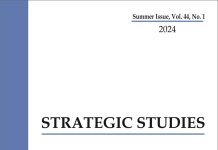Abstract
A terrorist attack on the Indian parliament on 13 December, 2001 resulted in a ten-month long military stand-off between India and Pakistan. Throughout this period, both sides conducted aggressive and provocative signalling by conducting missile tests, and through bellicose speeches, statements and press briefings. These signals were conveyed at various levels by the political, military, and bureaucratic leadership. This paper provides a theoretical framework about signalling, deterrence stability and the escalation risk grounded in the classical understanding on nuclear deterrence and escalation. The paper analyses the nuclear signalling during the stand-off in light of the theoretical framework. The paper tests the hypothesis that a high percentage of indirect signalling would induce instability into a nuclear crisis, and the large number of actors sending signals from either side would increase the likelihood of miscommunication. By sifting through media reports during the stand-off, an elimination exercise was conducted and 72 signals were identified and analysed. The paper is divided into five sections and points to the limitation of the Cold War model to explain the South Asian strategic stability dynamics and the need to work out a model specific to South Asian strategic dynamics.












